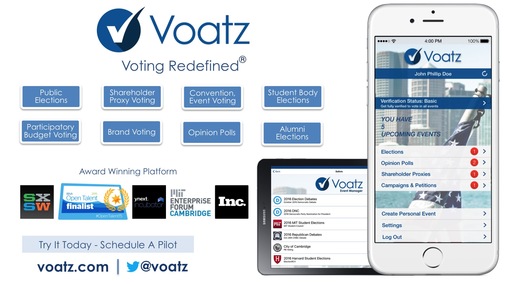 EMERGING TECH
EMERGING TECH
 EMERGING TECH
EMERGING TECH
 EMERGING TECH
EMERGING TECH
Blockchain-based mobile voting startup Voatz Inc. has landed its first big contract, with the State of West Virginia agreeing to use its platform for military voting. But the news has raised security concerns.
Voatz first came onto the radar in January when it raised $2.2 million in a seed round led by Medici Ventures, Overstock.com Inc.’s venture arm. It makes a mobile election voting platform that uses smart biometric and real-time identification verification on top of a custom-built blockchain for security and irrefutability.
The platform enables people to vote in different types of elections and voting events via a secured smartphone or tablet. Voatz claims its system overcomes concerns around security, auditability and voter anonymity.
West Virginia is using the Voatz platform to allow registered and qualified military voters who are deployed away from the state to participate in the November midterms.
“There is nobody that deserves the right to vote any more than the guys that are out there, and the women that are out there, putting their lives on the line for us,” West Virginia Secretary of State Mac Warner is quoted as saying today, although Warner did add that military voters can still opt for a paper ballot.
The platform has been trialed before, having been used at the Massachusetts Democratic Party State Convention in June and by West Virginia in during an election in March. However, despite the successful trials, some security experts have expressed alarm at the risks voting via a mobile device may present.
“Even without the current state of voting system integrity in the U.S., the thought of processing votes through phones is a bad idea, even if blockchain and/or facial recognition is used,” Rod Soto, director of security research at JASK Inc., told SiliconANGLE. “The introduction of third-party software applications along with the widespread digital transmission of voter activity fundamentally undermines the legitimacy of our voting processes.”
The upshot, he said: “By exposing these new attack surfaces and their inevitable vulnerabilities, West Virginia is essentially sending out an open invitation for interference with voting and the compromise valuable information.”
Indeed, he added, “several nation-states have previously targeted NATO soldiers via cell phone apps in order to track them and extract information. It’s likely that cyber actors will target this app for a variety of purposes.”
Sam Small, chief security officer at ZeroFOX Inc., looked at both sides. “For some, the ubiquity of mobile devices and the convenience of mobile apps may make online voting seem like an appealing option or an inevitable future,” he said.
But he also noted that “unfortunately, securing electronic and online voting systems presents us with a set of unique challenges that are notoriously difficult to overcome. In particular, experts in this area must find a way to simultaneously address three key-requirements: voter anonymity, verification of individual votes and end-to-end election integrity.”
The problem, he added, is that “time and again, security researchers have exposed flaws in existing voting systems, schemes, and protocols — clearly demonstrating the difficulty inherent in securing even purpose-built electronic voting systems.”
On top of that, it’s very difficult to secure an election run on consumer mobile devices with myriad different operating system versions, configurations and network conditions. “Until the scientific community makes further advancements, I’d wager that virtually no credible electronic voting security expert would endorse or encourage plans to run an election on consumer-owned mobile devices,” he said.
THANK YOU